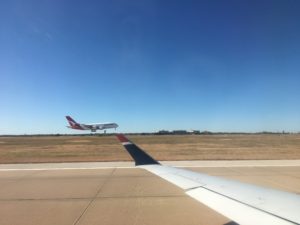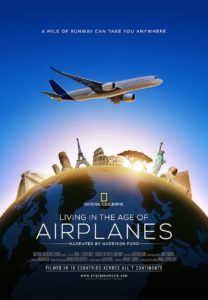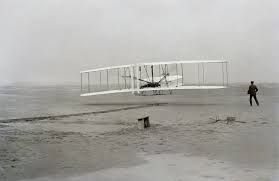This morning I boarded a flight from Fargo to Albuquerque, New Mexico, bound for a short three-day certification class for my full time job. It was o-dark-thirty when I arrived at Hector for check-in and boarding, and with the weather outside a nasty mix of cold rain and fierce east wind, the takeoff and climb out wasn’t exactly a glorious flight into the morning sun. It was also a full aircraft, a smallish American Airlines CRJ-900. Somehow despite reserving a window seat at booking I ended up with an aisle seat, which is something I typically avoid.
Normally I spend most flights gazing out the window, taking photos and if cloudy, reading. With my seat mate instantly going into sleep mode, and my thinking it might be kind of creepy if I

leaned over her the entire flight to look out the window–the view outside was dark and cloud covered anyway–I decided to take care of some business and composed the first draft of our 2016 Family Christmas Letter. Followed a page from my kid’s playbook and listened to “Hamilton” doing that. Shockingly enough I am starting to learn the words to the 2+ hour Broadway cast recording, and almost started singing out load when Jonathan Groff started telling me that “You’ll Be Back.”

Fortunately for the sleeping woman next to me I was able to restrain myself. After I finished the letter, I glanced left (east) and took in the beginnings of the orange glow of sunrise. Typically I am not a very good sleeper on aircraft, and after a couple of minutes of trying I instead plugged the headphones into the iPad and started up a 47 minute documentary from producer / director Brian J. Terwilliger, “Living in The Age of Airplanes.”
 I instantly wished that my iPad Mini could be transformed into a bigger 12″ iPad Pro, as I was sucked into the Harrison Ford-narrated, James Horner-scored (one of his last before his untimely death in, ironically, an airplane crash) homage to the most important technological innovation in human civilization.
I instantly wished that my iPad Mini could be transformed into a bigger 12″ iPad Pro, as I was sucked into the Harrison Ford-narrated, James Horner-scored (one of his last before his untimely death in, ironically, an airplane crash) homage to the most important technological innovation in human civilization.
As the film laid out, think of the scope of human history, which is approximately 200,000 years old now. Think of how far the majority of people travelled during their lives for most of that history. Think of how, even with the advent of steam-powered ocean travel and rail, for so long the majority of long distance travel was one way. In the last 100 years we have gone from an average speed of 30-60 miles per hour on long distance trips (rail) to around 500 mile per hour. For the majority of human existence, entire civilizations could be born, flourish and fade out of time without ever even knowing other civilizations existed. During the time of Christ, the known-world for most Europeans consisted of the Roman Empire: The Continent, the Mediterranean, and North Africa. Only the earliest of rumors existed of massive cultures to the Far East, and nothing was known of the sprawling and advanced civilizations growing on North and South America.
Sail-powered ocean navigation and later the aforementioned steamship changed the world dramatically, of course. Still, it took a long time to cruise the seas, and journey’s were measured in weeks or months. And an extremely small percent of the world’s population even travelled at all, with most remaining bound to their communities of birth. The journey I am on today, without an aircraft, would have taken 19-20 hours of non-stop driving at 70-75 miles per hour. Or around 247 hours back in the horse-drawn days. Compare this to now, the age or air travel, when there is no single place we can not access on the entire planet within one days time.
“The airplane became the first World Wide Web, bringing people, languages, ideas and values together.” — Bill Gates
This month the USA held their Presidential elections, and while I won’t go to much into the ugly details in this post, we all know the outcome. Bottom-line is that a large number of people sided with a populist, nationalistic and isolationist viewpoint. There was a desire for a return to the “glory days” of US world power, despite of real lack of knowledge of that those glory days actually were. Many people feel betrayed by globalism, with the exchange of goods and services and ideas taking place no longer on the 19th and early 20th century scales of dozens or maybe hundreds of miles, but on scales which truly have no Earthly limits. Ships remain an important factor in terms of raw tonnage of supplies and manufactured goods in commerce, but the airplane has truly been the key to unlock cheap, fast transportation of, well, anything on a global basis. This iPad started with design work in California, transmitted digitally (the computer and internet is certainly tied for the most vital innovation of 20th century) to China, where the components are refined from raw materials, assembled, then shipped back, likely by air, to the USA.

If those who fear the global integration of manufacturing, financial and information networks really need someone to blame, don’t bother targeting the workers in China and other countries who have been lifted out of poverty by such trade. No, you might as well go after Wilber and Orville Wright. Or Glen Curtiss. Or Boeing, McDonnell, Lockheed, Northrop, Cessna, Beach, and hundreds of other aviation pioneers who paved the way for the marvel that today is routine air travel. Without them, we would still be living in a world where you probably, unless incredibly wealthy, would never venture more than a few dozen miles from home. Without them, we would still be sentenced to work, for likely the rest of our lives, in the same trade that our fathers and grandfathers had worked, no matter what our personal interests might be. Without them, we would never have the opportunity to meet people of different cultures and countries, to know the amazing differences and skills that humanity possesses. We would walk the world largely alone, and not part of the greater global community.
We can not go back. The genie is out of the bottle. The same problem applies to the internet. We can not simply turn it off, and nor can we simply land all the aircraft, and simply bury our heads in the sand and pretend the rest of the world doesn’t exist. We grow, we adapt. We spread out wings and fly, or we sentence ourselves to living on the ground and fighting over the dirt.
**********
The film wrapped up by discussing how the incredible as become so routine. How something so marvelous has, for many, become so frustrating. Delays, cramped seats, no or poor food…It has become a necessary mode of transportation for so many, and many forget how absolutely incredible it is that they are even able to travel this way at all. The movie refers to an airport as a portal to the world, where any destination is literally within walking distance. How can anyone overlook that when they are waiting to board?
I have never viewed it as anything other than a wonder when I am in the air. I am like a kid on their first flight, straining my neck to look out the windows and take in the majesty of the world below me. My sleeping neighbor prevented me from getting a view this morning, but “Living in The Age of Airplanes” was certainly a worthy second choice. I won’t miss the view on the way home, however. After all, as Harrison Ford reminds us during the film, from 35,000 feet we can look out and see more in that glance than the majority of human beings in our entire history ever saw in their entire lives. And despite the issues we have created on the surface, the view from that height is still magnificent.
Closing down borders, refusing to share in the greatness that is our world and our species, is not the answer. We need to share that view from on high, share that perspective, with as many as possible. Always forward.
“Man must rise above the Earth—to the top of the atmosphere and beyond—for only thus will he fully understand the world in which he lives.” — Socrates
